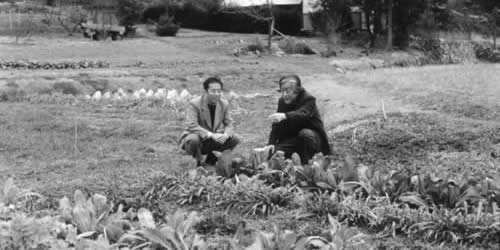 |
|
 |

 |

The contents here are partially modified from a newspaper article issued in February 2002. |

Teaching about computers may be important, but we should realize, once again, that allowing children to milk goats, grow their own vegetables, and have other firsthand experiences filled with touch and smell is a key to the development of their wisdom.

Yamada: |
Although I have been interested in Mongolia for a long time, it was only last year that I finally realized my long-cherished dream of standing on the earth of that vast country. Mr. Onuki, I understand that you have had a constant devotion to Mongolian studies for about 40 years and considered a variety of problems in Japan from the perspective of the "land of nomads." Is that correct?
|
Onuki: |
Yes. I conducted several long-term studies while living with nomadic families, for one or two years, as well as short-term field studies. I traveled back and forth between Japan and Mongolia many times. In a sense, Mongolia is antithetical to Japan. From the point of view of market principles, Mongolia's nomadic society may be thought of as a developing country. From another point of view, however, we find wonderful things in this country that people call "underdeveloped." Persons who have always lived in Japan may get so accustomed to the Japanese way of life that they lose sight of the true status of things.
|
Yamada: |
I've had the same sort of experience. When I visited so-called developing countries or regions, I found that the people there look so satisfied and happy, despite their lack of sophistication in science and technology. Even though they are have-nots, they still make good use of the wisdom of traditional preventive medicine in their efforts toward achieving good health. In Russia, Armenia, Bulgaria, Romania, and other countries, the bee products that we sell are actually used in clinical settings. My visits to these countries caused me to wonder if Japan really is rich. I came to realize that wealth or happiness does not depend on possessions but on how people interact with each other.
|
Onuki: |
You can say that again. I was most impressed with the family ties I observed in Mongolia. There, the entire family lives in one ger, which resembles a tent, including a father, a mother, and a dozen or so of their children, as well as their grandparents. Essentially, a family is a place where its members reproduce their lives and possessions. In Mongolia, at least three generations of family members help each other and, supported by the love of the family, work directly on the land to make a "living." In Japan, in contrast, urbanization has advanced so much that it is now quite difficult for three generations of family members to live together, causing the family to lose important functions that it once had.
|
Yamada: |
Previously, parents and adults in the community taught their children the cycle of life in the nature around them and various skills in everyday life and farm work. If farm villages continue to disappear the way they are now, families will lose the ability to pass down their culture to future generations.
|
Onuki: |
In Mongolia, I once stayed with a family with 13 children. When I talk about this experience in Japan, ladies with children often say, "Raising 13 children would drive me mad because raising only one is hard work." When I lived with the Mongolian family, however, the older children took care of the younger ones and, to some degree, brothers and sisters played the roles of fathers and mothers. That's why mothers in Mongolia look self-confident. There, a family is a group of people with different experiences because of their age differences. All the family members are supposed to work with the land. Therefore, each one does a different kind of work according to his or her experience and age. As a family, they accomplished the wonderful task of working with the land carefully, thoroughly, and efficiently.
|
Yamada: |
I understand that such a life will form a foundation for nurturing children's hearts. |
|
|


|
 |



